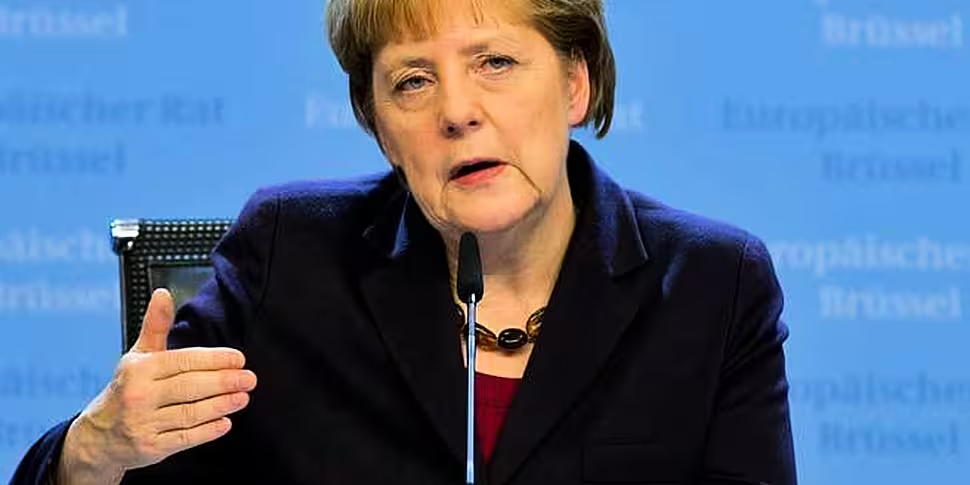The US Vice President, Joe Biden, has called on President Putin to prove that Russia wants an end to the conflict in eastern Ukraine.
Speaking at a meeting of world leaders in Munich, he told Mr Putin, "don't tell us - show us".
German Chancellor Angela Merkel has said the latest bid to resolve the Ukrainian conflict is "uncertain but worth trying", as the French President warned it was "one of the last chances" for peace.
Speaking at the security conference, Mrs Merkel also said Russia "needs to its bit" to resolve the crisis.
She accused Moscow of showing "territorial disrespect" for its neighbour, and said international law had been violated.
Mrs Merkel told the summit: "We want to shape security on Europe together with Russia not against Russia.
"Russia needs to do its bit in the Ukrainian crisis as well.
"This crisis cannot be resolved by military means."
Her comments come after she and the French President Francois Hollande met Russian leader Vladimir Putin in Moscow, in what was widely seen as a last-ditch attempt to thrash out a deal to end fighting which has claimed the lives of more than 5,300 people.
Mrs Merkel and Mr Hollande went to Moscow with a peace proposal discussed during a separate meeting with Ukrainian President Petro Poroshenko on Thursday.
Despite no major breakthrough in the negotiations, a Kremlin spokesman said Friday's talks were "substantial and constructive".
Mrs Merkel said of the peace efforts: "It is uncertain whether it will lead to success, but from my point of view and that of the French president (Francois Hollande) it is definitely worth trying."
"I believe we owe that much to those who are affected in Ukraine."
Mr Hollande told reporters: "I think this is one of the last chances, that's why we took this initiative."
"If we don't manage to find not just a compromise but a lasting peace agreement, we know perfectly well what the scenario will be. It has a name, it's called war."
Asked at the Munich talks whether he thought the peace proposal could work, Mr Poroshenko replied: "Yes."
The British Foreign Secretary, Philip Hammond, says talking is the only way forward:
'Turning point'
Russia's Foreign Minister Sergei Lavrov, also at the Munich talks, said: "We believe that there are good grounds for optimism to issue recommendations for conflict resolution."
"It is important for everybody to realise the scale of the problem. The world is at a turning point."
Amid a debate in Washington over whether to send weapons to help the Kiev government fight pro-Russian rebels, the German Chancellor argued this would not help end the crisis.
"There is already a large number of weapons in the region and I don't see that this has made a military solution more likely," she said.
Her comments were echoed by Germany's defence minister Ursula von der Leyen.
"Are we sure that we would be improving the situation for the people in Ukraine by delivering weapons?" Mrs Von der Leyen asked the conference.
"Are we really sure that Ukraine can win against the Russian military machine?" she added.
But NATO's top military commander has said this should not be ruled out.
US Air Force General Philip Breedlove told reporters at the Munich conference: "I don't think we should preclude out of hand the possibility of the military option. The situation is worsening and we need to address the worsening situation."
"It is important that we use all the tools in the toolbox to address this."
Ukraine 'fighting for survival'
Clashes between pro-Russian separatists and Ukrainian forces in the east of the country have escalated in recent weeks, despite a peace deal agreed in Minsk last September.
A spokesman for the Ukrainian military said five soldiers had been killed and 26 wounded in fighting in the last 24 hours alone.
He said separatists had stepped up shelling of government forces and appeared to be amassing for new offensives on the key railway town of Debaltseve and the coastal city of Mariupol.
There are also fears of a growing humanitarian crisis in the country.
The West accuses Russia of sending troops and weapons across the border although Moscow has consistently denied backing the rebels.
The talks came as rebels and Ukrainian troops briefly halted fighting in the embattled eastern town of Debaltseve to allow the evacuation of civilians.
Both sides sent convoys of buses into the town to rescue residents who have been trapped without power, heat or running water for two weeks.
Rebel forces have encircled the town and are engaged in a violent battle for control with government troops.
Debaltseve is a key railway hub between the two main rebel-controlled cities of Donetsk and Luhansk which are facing a major humanitarian crisis.
Fears that the conflict is spiralling out of control have prompted the US to consider supplying lethal weapons to Ukraine, an option opposed by European nations.









